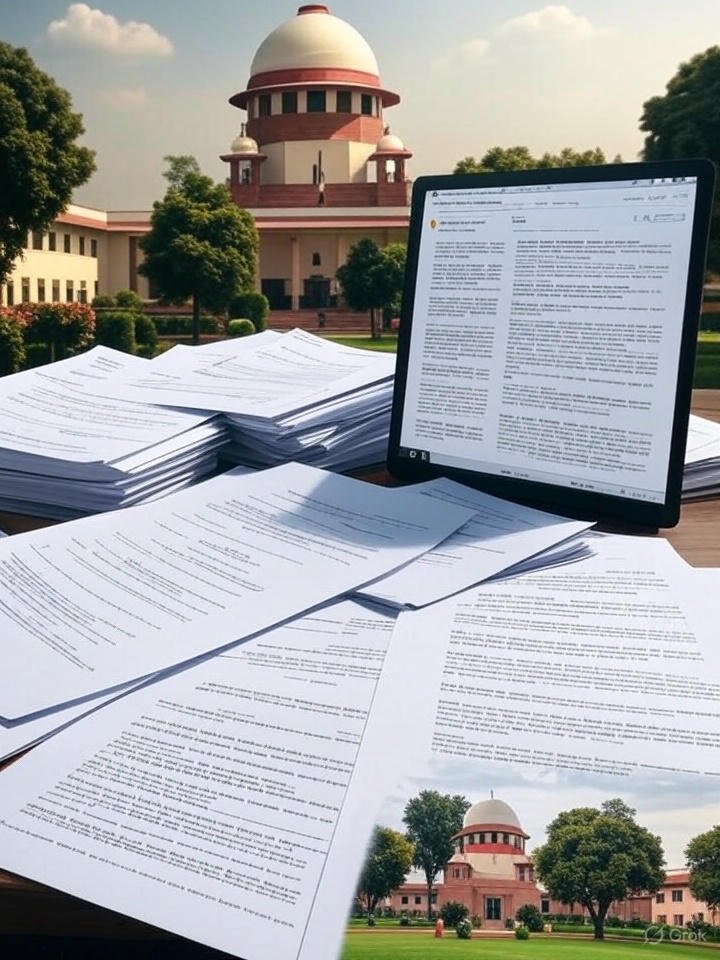👉 हिंदी में पढ़ने के लिए यहां क्लिक करें
In India, land ownership is a complex and often contentious issue due to historical, legal, and administrative challenges. While property registration is a critical step in establishing ownership, a recent Supreme Court ruling has clarified that registration alone does not guarantee legal ownership. This article explores why a registered deed is not conclusive proof of land ownership, examines expert views, lists essential documents for proving ownership, and proposes solutions for a well-defined ownership system. This guide is designed to help property buyers, sellers, and developers navigate India’s real estate landscape effectively.
The Presumptive Nature of Land Ownership in India
Land ownership in India is primarily determined through a registered sale deed, governed by the Registration Act, 1908, and the Transfer of Property Act, 1882. However, ownership is considered presumptive rather than conclusive. This means that a registered sale deed, while a public record of a transaction, does not inherently guarantee that the seller holds a valid legal title. The onus of verifying the title’s authenticity falls on the buyer, not the government or the registrar.
Several factors contribute to this complexity:
- Historical Issues: The legacy of the zamindari system and poorly maintained records have led to unclear titles.
- Legal Gaps: The absence of a centralized, conclusive titling system allows disputes over ownership.
- Administrative Challenges: Inconsistent land record management and slow digitization exacerbate the problem.
The Supreme Court’s 2025 ruling emphasized that legal title and actual possession are critical for ownership, not just registration. A registered deed can be challenged if the title history is flawed or if possession is not lawfully transferred.
Expert Views on Land Ownership Challenges
Experts across legal and real estate sectors highlight the following issues:
- Legal Experts: Senior Supreme Court lawyer Aditya Parolia notes that about 66% of civil disputes in India are related to land or property ownership. He emphasizes the need for thorough due diligence, including verifying the chain of title and obtaining encumbrance certificates to ensure no legal disputes or liens exist.
- Real Estate Analysts: Analysts from organizations like PRS India point out that gaps in old land records and the lack of integration between records and registries make ownership disputes common. They advocate for a shift to a conclusive titling system, as seen in countries like Australia and the UK, where the state guarantees titles and compensates for errors.
- Government Officials: The Digital India Land Records Modernisation Programme (DILRMP) aims to digitize records and move toward conclusive titling. However, officials acknowledge that progress has been slow, with only some states implementing robust online portals like Bhoomi (Karnataka) and Bhulekh (Uttar Pradesh).
Why Registration Alone Is Insufficient
A registered sale deed is a record of a transaction, not a government-guaranteed title. Key reasons why registration does not equate to ownership include:
- Lack of Physical Verification: Registrars verify the identity of buyers and sellers but do not always cross-check the land’s physical attributes or the seller’s legal title.
- Unregistered Transactions: Certain property transactions, if not registered as mandated by the Registration Act, are inadmissible in court, weakening ownership claims.
- Adverse Possession: Illegal possession can gain legitimacy through adverse possession laws, complicating ownership disputes.
- High Costs: Stamp duty (4-10%) and registration fees (0.5-2%) discourage registration, leading to undocumented transactions.
Solutions for a Well-Defined Ownership System
To address these challenges and ensure clear land ownership, experts and policymakers propose the following solutions:
- Conclusive Titling System: Transitioning to a state-guaranteed titling system, as recommended by the 2009 Committee on Financial Sector Reforms, would provide clarity. The government would verify and guarantee titles, offering compensation for disputes.
- Digital Integration: Full integration of land records and registries through DILRMP can streamline verification. States should prioritize online portals with real-time updates and clear criteria for fund allocation.
- Capacity Building: Training for patwaris, survey staff, and registration officials is essential to improve record management at the local level.
- Legal Reforms: Simplifying registration processes, reducing stamp duty, and enforcing mandatory registration for all transactions can minimize disputes.
- Public Awareness: Educating buyers about the importance of due diligence and legal consultation can reduce fraud and disputes.
Essential Documents to Prove Land Ownership
To establish undisputed ownership, buyers must collect and verify the following documents:
- Sale Deed: The primary document recording the transfer of ownership. It must be registered at the sub-registrar’s office.
- Title Deed: Confirms the legal ownership history and chain of title.
- Encumbrance Certificate (EC): Verifies that the property is free from legal disputes, liens, or mortgages. Obtainable from the sub-registrar’s office.
- Mutation Record: Updates government records with the new owner’s details. Essential for legal recognition.
- Property Tax Receipts: Proof of regular tax payments, reinforcing ownership claims.
- Khata Certificate/Extract: Certifies that property taxes are paid and includes details like location and survey number.
- Survey Reports: Confirm property boundaries and size to avoid disputes.
- No Objection Certificates (NOCs): Required for properties in specific areas (e.g., illegal colonies in Punjab before July 31, 2024).
- Identity and Address Proofs: PAN card, Aadhaar card, or utility bills for buyer, seller, and witnesses.
- Possession Letter: Confirms lawful possession of the property.
Steps to Verify Ownership
To ensure a secure transaction, follow these steps:
- Conduct a Title Search: Verify the property’s ownership history through state portals or sub-registrar records.
- Obtain an Encumbrance Certificate: Check for legal or financial liabilities.
- Update Mutation Records: Ensure the latest ownership details are reflected in government records.
- Consult Legal Experts: Engage professionals to scrutinize documents and ensure compliance.
The Future of Land Ownership in India
The Supreme Court’s ruling has sparked a push for systemic reforms in India’s real estate sector. By adopting conclusive titling, digitizing records, and improving administrative efficiency, India can create a transparent and secure property market. Buyers and developers must prioritize due diligence, leveraging legal expertise and state portals to verify ownership. As the real estate sector evolves, staying informed about legal changes and maintaining updated documents will be crucial for secure investments.
Conclusion
In India, relying solely on a registered deed for land ownership is risky due to the presumptive nature of titles and systemic challenges. By understanding the limitations of registration, collecting essential documents, and advocating for conclusive titling, stakeholders can secure their property rights. This comprehensive approach ensures transparency, reduces disputes, and fosters a robust real estate ecosystem.






Join The Discussion